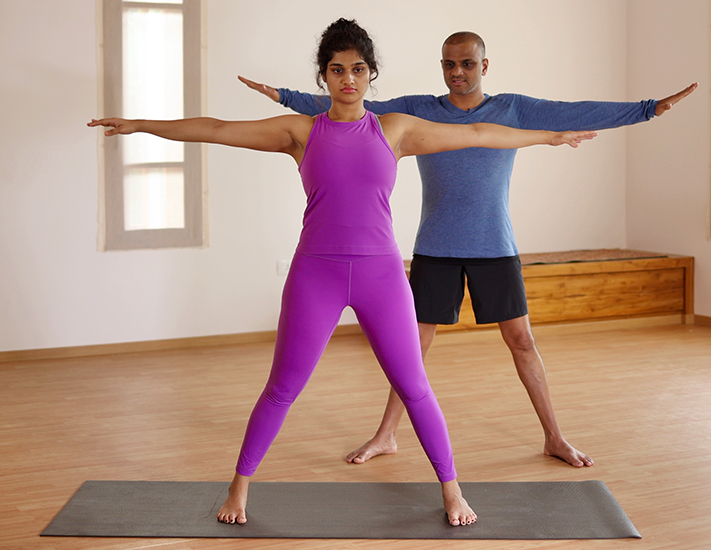It’s no surprise that feeling good is good for you. But just how good was up for debate until the National Institutes of Health (NIH) decided to fund several scientists from different collegiate institutes—including the University of Wisconsin’s Center for Investigating Healthy Minds, Stanford’s Center for Compassion and Altruism Research and Education, and University of North Carolina-Chapel Hill’s Positive Emotions and Psychophysiology Laboratory—to further investigate the effects of positive emotions on the body. In August, the NIH published an online article of the results, which revealed that an upbeat mental state may indeed help lower blood pressure, reduce the risk for heart disease, promote a healthier weight, improve blood sugar levels, and add years to your life.
While happiness sounds like the perfect Rx for common health concerns, it’s difficult to prescribe, especially if you’re not a naturally peppy, glass-half-full kind of person. Spare yourself the eye-roll and doom-and-gloom mindset. Instead look on the bright side: Researchers found that adopting simple positive practices could help boost anyone’s outlook overall and well-being. Here’s how.
1. Teach your brain to savor the good moments.
A team at Wisconsin’s Center for Investigating Healthy Minds (CIHM) sought to learn more about why some people can draw an extended period of pleasure from a beautiful moment, such as a colorful sunset, or lucky occurrence, like finding money unexpectedly, while others felt good for just a brief period after the event. The question is significant, as the inability to “sustain positive effect,” as the researchers put it, is linked to depression.
In the study, researchers asked about 100 people to play guessing games that sometimes rewarded the participants with money. Wins were intended to elicit positive bursts of emotion while not winning was meant to bring out negative feelings. Using functional Magnetic Resonance Imaging (fMRI), which measures brain activity through changes in blood flow, researchers saw that people who had more activation in the ventral striatum (a reward center) tended to feel better for a longer period of time following a positive event. The good news is, you don’t always need to win cash to trigger happiness. It appears you can learn to activate this reward center on your own and prolong good feelings. One way to do this, researchers suspect, is by practicing a specific type of meditation called loving-kindness meditation.
“Training in loving-kindness meditation may facilitate sustained activity in reward circuits such as the ventral striatum,” says Aaron Heller, study author and assistant professor of psychology at University of Miami. “It may be that this type of training in turn increases sustained positive emotion.” Loving-kindness meditation is designed to help cultivate love and appreciation for everyone in your life—even the people who may not conjure warm and fuzzy feelings, like a pushy boss or the bad driver who gave you road rage. In loving-kindness meditation, you begin by silently repeating phrases wishing happiness and well-being to yourself, i.e., “May I live in safety, be happy, be healthy, and live with ease.”
Gradually, begin to extend those same wishes out to others until you’ve dedicated them to all beings everywhere, recommends Sharon Salzberg, author of Real Happiness: The Power of Meditation. She suggests trying it for 10 minutes a day for a month, and while it’s totally legit to do it on the comfort of your meditation cushion at home, Salzberg says you can also practice while you’re walking around or driving to work, wishing good things for yourself and those whom you pass along the way.
Related: Try a 10-Minute Loving-Kindness Meditation Practice
2. If you want to make a change, think about the things that matter most to you.
Sometimes the things that you know are good for you—like eating more vegetables, going to bed earlier, and flossing every day—can feel like a pain or hassle. If you’ve had trouble sticking to a positive habit you’ve been trying to adopt, the way to move forward may be to connect those changes to your larger values or the things that matter to you most.
Emily Falk, Ph.D., a neuroscientist at the University of Pennsylvania, sought to determine whether self-affirmation—the practice of reflecting on the things that matter to you—might help break down the mental barriers people put up when confronted with messages asking them to change unhealthy habits. She and her research team found that when inactive people were asked to think about what’s important to them, such as their families, before being subjected to messages about changing their health, they experienced more activity in a brain region associated with one’s sense of self, showing that the messages resonated more with them. Those same persons went on to increase their levels of activity more than others who were in a control group.
So what does this mean for you? Falk says that gratitude journaling, taking a few minutes out of each day to write down a handful of things that you are thankful for, may help you stay focused and committed to the changes you wish to make, because you’ll be thinking about how your decisions affect the things that matter the most in your life. “Affirmations tend to work best when you’re thinking about your broader sources of meaning and purpose, and researchers outside of my team have found that writing down three things that you’re grateful for each day can make you happier and healthier,” Falk says. Try jotting down a handful of things or names of people you truly appreciate tomorrow morning, and see if you feel any more motivated to opt for salmon and salad over steak frites later in the day.
3. Change your attitude, add years to your life.
Researchers at University College London analyzed more than 70 studies examining the relationship between outlook and mortality dating back to 1969. Half of the studies were conducted on healthy individuals (2,444 people), while the other half were conducted on people battling various diseases (1,397 people). They found that in both groups, being optimistic and generally happy had “a favorable effect on survival,” as the authors put it. They all experienced lower death rates when armed with positive psychological well-being. It’s not entirely clear as to why this is, and it could be a combination of several factors, according to one of the authors of the UCL review.
“Happiness could be a marker of some other aspect of people’s lives which is particularly important for health,” said professor Andrew Steptoe, Ph.D. “For example, happiness is quite strongly linked to good social relationships, and maybe it is things like that that are accounting for the link between happiness and health.” On the flip side, there’s mounting evidence against flipping out. That same University College London team found that anger and hostility are associated with coronary issues. They suggest that anger management might help treat or even prevent heart disease.
If you want to inject more positivity in your own life, but aren’t naturally a sunny person, you can start by just trying to notice the times when you find yourself saying or thinking negative thoughts, recommends an anxiety researcher and therapist Amy Przeworski, Ph.D., an assistant professor at Case Western Reserve University in Cleveland. Write it down and then try to make cases for and against why that thought is legit. Over time, you’ll find that a lot of those downer impulses don’t have a lot of evidence backing them up, which makes it easier to let go of them.
Related: The Remarkable Ways Yoga Keeps You Young
4. Proactively choose to connect more deeply with people.
Researchers from Carnegie Mellon University paid nearly 200 subjects $800 each to sit through a nightly telephone interview for two weeks straight. During that time, researchers asked a battery of questions that helped them assess whether a person had a “positive emotional style” (being generally happy, lively, and calm) or a negative one (depressed, anxious, or hostile). At the end of those two weeks, the volunteers were brought into a lab, placed into a room, and exposed to either rhinovirus (the bug culprit behind the common cold) or influenza virus.
Researchers then tracked the subjects for signs of infection using nasal exams, blood tests, and self-reported symptoms. While more than 80 percent of volunteers displayed signs of infection in the sense that the viruses were present in blood or mucus tests, only 32 percent developed a full-on cold. Researchers found that, after controlling for several variables, positive people were less likely to have developed a cold following exposure.
Interestingly, those who were positive and had a higher number of “social roles” in their community—such as being a spouse, parent, friend, team player, or volunteer—appeared to be even more protected from developing disease. Sheldon Cohen, Ph.D., who directs the Laboratory for the Study of Stress, Immunity and Disease at Carnegie Mellon University, credits this apparent “social protection” to a variety of potential factors, including support from friends and family to take better care of yourself. But Cohen says another element may be that people who have more connections with others are just happier.
“We find that socially integrated people have more positive emotions,” Cohen said in a video recounting his lab’s findings. “They have higher levels of self-esteem, they have greater optimism, and they have stronger feelings of control over their environment. And we think all of these things are known to impact health in a positive way.” So rather than stay inside to steer clear of colds this fall and winter, try expanding your social circle and work on deepening your current relationships. If you’re not the outgoing type, push yourself to get involved with a volunteer group working on a cause that matters to you. Even joining a book club will help you get to know more people, and develop stronger social bonds. When it comes to fending off bugs, we appear to be stronger together.









Comments (0)